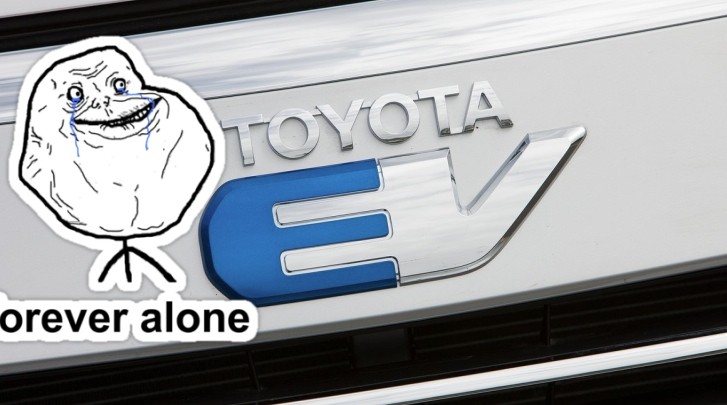Tesla recently said their contract with Toyota is about to expire this year and the company’s last electric vehicle in production RAV4 EV won’t receive any more batteries so it will have to be axed. But Toyota is OK with that...
The whole planet knows Toyota for the Prius, the first mass produced and most popular hybrid vehicle ever created, loved by green-heads and hated by guys with big V8s. But having the electric technology at command, Toyota also experimented with EVs.
First, it made the iQ EV, which got produced in a limited number of which most stayed in Japan. Even fitting it with a range extender didn’t push up the sales so it remained some king of mini experiment just like the Aston Martin Cygnet.
Then, there was the RAV4 EV. The first batch was made between 1997 - 2003 and around 1,400 units were sold in California. The need to replace the expensive batteries after a certain amount of time made it an unfeasible deal.
After that, in 2012, Toyota signed a huge contract with Tesla Motors to benefit from their Model S batteries and fit them in the RAV4 EV. Even so, an all-electric SUV is not that of a good idea - it’s not suited for city traffic because its a bit big for an EV and you also can’t go off-road because you’ll get stranded there when the juice ends.
As you can imagine, the second run of the RAV4 EV was not a sales buster, so now that the deal with Tesla is ending, Toyota decided to leave it there as it has bigger fish to fry. Like the new hydrogen fueled sedan it plans to introduce next year in California, as well as a hydrogen refueling station network.
Honestly, we think this is a smart move. If Toyota manages to make the whole fuel-cell technology come true, it will solve the classic EV problems like limited range and big recharging times.
In case you’re new to the whole fuel-cell technology, Toyota’s FCV will use pressurized hydrogen which will get mixed with air in a special fuel-cell to create water and electricity that can be either sent to the wheels or stored in batteries. It’s like having an EV with range extender but without the extra emissions and filling up the hydrogen tanks takes around 3 minutes.
It makes sense to stop investing in a technology that will limit you at some point (i.e. EVs) and concentrate on something that will keep driving pretty much as it was until now - just fill up a tank and go.
As with the Prius hybrid, people are reticent when it comes to the new fuel-cell technology, with pricing and safety being the top concerns. However, Toyota is currently working to reduce production costs of the FCV to under $70,000. Regarding safety, the automaker’s hydrogen tanks are said to resist 70 MPa (690 atm/10.150 psi).
Which sounds enough. Toyota said it even fired bullets at it and it took a 50-caliber armor piercing round to penetrate the shell. And even so, it only left a hole and the hydrogen simply leaked out.
First, it made the iQ EV, which got produced in a limited number of which most stayed in Japan. Even fitting it with a range extender didn’t push up the sales so it remained some king of mini experiment just like the Aston Martin Cygnet.
Then, there was the RAV4 EV. The first batch was made between 1997 - 2003 and around 1,400 units were sold in California. The need to replace the expensive batteries after a certain amount of time made it an unfeasible deal.
After that, in 2012, Toyota signed a huge contract with Tesla Motors to benefit from their Model S batteries and fit them in the RAV4 EV. Even so, an all-electric SUV is not that of a good idea - it’s not suited for city traffic because its a bit big for an EV and you also can’t go off-road because you’ll get stranded there when the juice ends.
As you can imagine, the second run of the RAV4 EV was not a sales buster, so now that the deal with Tesla is ending, Toyota decided to leave it there as it has bigger fish to fry. Like the new hydrogen fueled sedan it plans to introduce next year in California, as well as a hydrogen refueling station network.
Honestly, we think this is a smart move. If Toyota manages to make the whole fuel-cell technology come true, it will solve the classic EV problems like limited range and big recharging times.
In case you’re new to the whole fuel-cell technology, Toyota’s FCV will use pressurized hydrogen which will get mixed with air in a special fuel-cell to create water and electricity that can be either sent to the wheels or stored in batteries. It’s like having an EV with range extender but without the extra emissions and filling up the hydrogen tanks takes around 3 minutes.
It makes sense to stop investing in a technology that will limit you at some point (i.e. EVs) and concentrate on something that will keep driving pretty much as it was until now - just fill up a tank and go.
As with the Prius hybrid, people are reticent when it comes to the new fuel-cell technology, with pricing and safety being the top concerns. However, Toyota is currently working to reduce production costs of the FCV to under $70,000. Regarding safety, the automaker’s hydrogen tanks are said to resist 70 MPa (690 atm/10.150 psi).
Which sounds enough. Toyota said it even fired bullets at it and it took a 50-caliber armor piercing round to penetrate the shell. And even so, it only left a hole and the hydrogen simply leaked out.
